The house cleaning industry is traditionally a locally driven market that has long relied on word of mouth and referrals to build trust and clientele.
Today, online reviews significantly impact consumer choices and business visibility.
This study investigates online reviews and the extent to which AI-generated reviews have permeated the house cleaning service industry in the United States.
The aim here is to uncover how widespread unchecked AI-written reviews have become, how their usage has evolved over time within the industry, and what implications this may hold for customers and businesses.
The findings presented in this study are based on customer reviews collected from 10 major US cities using the Originality.ai AI Detector to classify and evaluate the presence of AI-generated content.
This study investigates the increasing presence of AI-generated content in online reviews for house cleaning services across the United States between 2020 and 2025.
Analyzing customer reviews from 100 businesses across 10 major cities, we aim to assess how generative AI is shaping consumer feedback in a traditionally local, service-driven industry.
Our analysis is guided by several key research questions:
By answering these questions, this study highlights how digital technologies are reshaping consumer trust, business reputation, and the online review landscape in a sector historically driven by word-of-mouth and community trust.
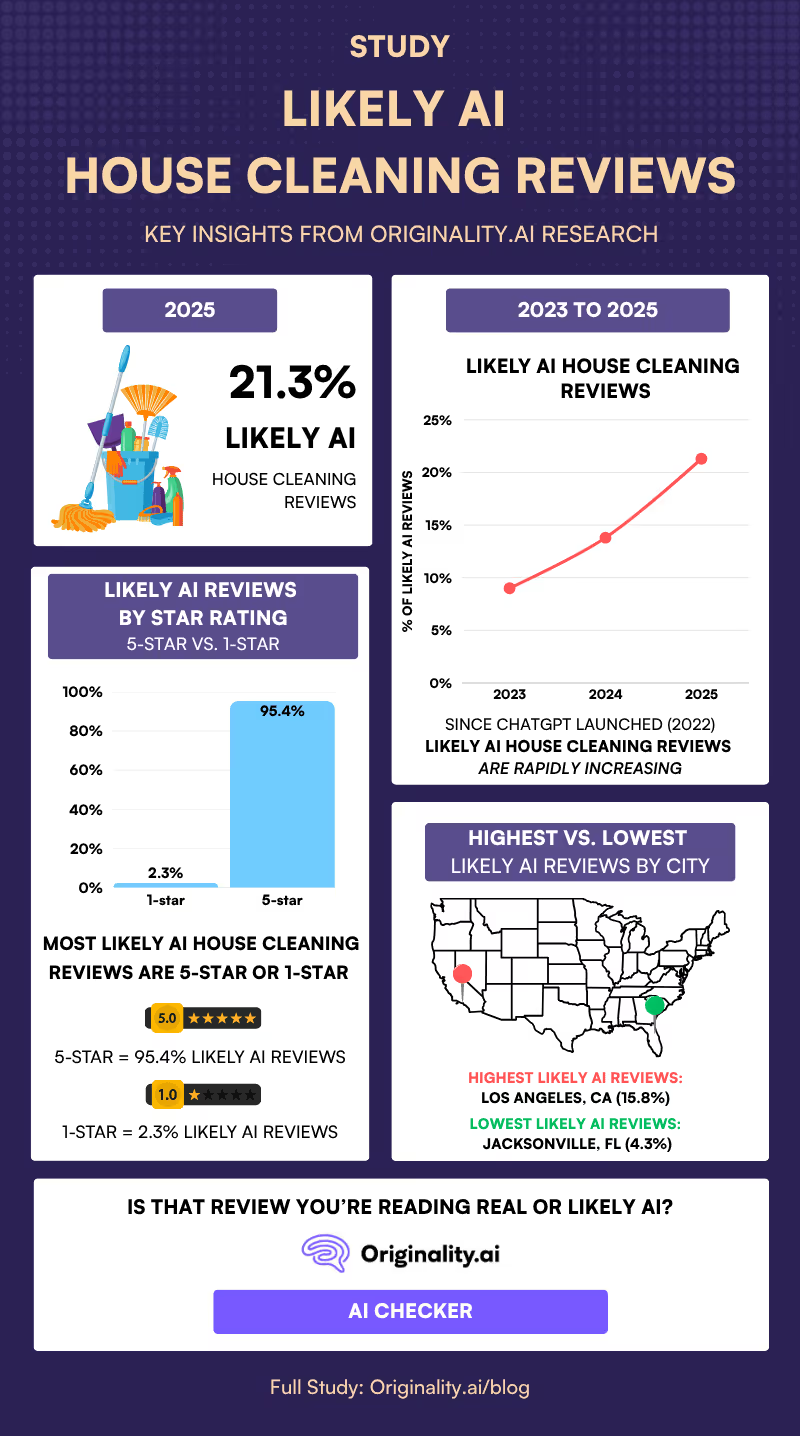

The trend analysis revealed a rapid rate of growth in Likely AI-generated reviews from 2020 to 2025, especially following the launch of ChatGPT in 2022.
In the early years of the dataset, Likely AI-classified reviews were minimal (below 4%). However, beginning in 2023 (following the 2022 launch of ChatGPT), a sharp increase was observed:
This steady growth reflects the increasing use of AI in online feedback and reviews.
Further, as of 2025, more than 1 in 5 reviews (21.3%) in the house cleaning industry are Likely AI.
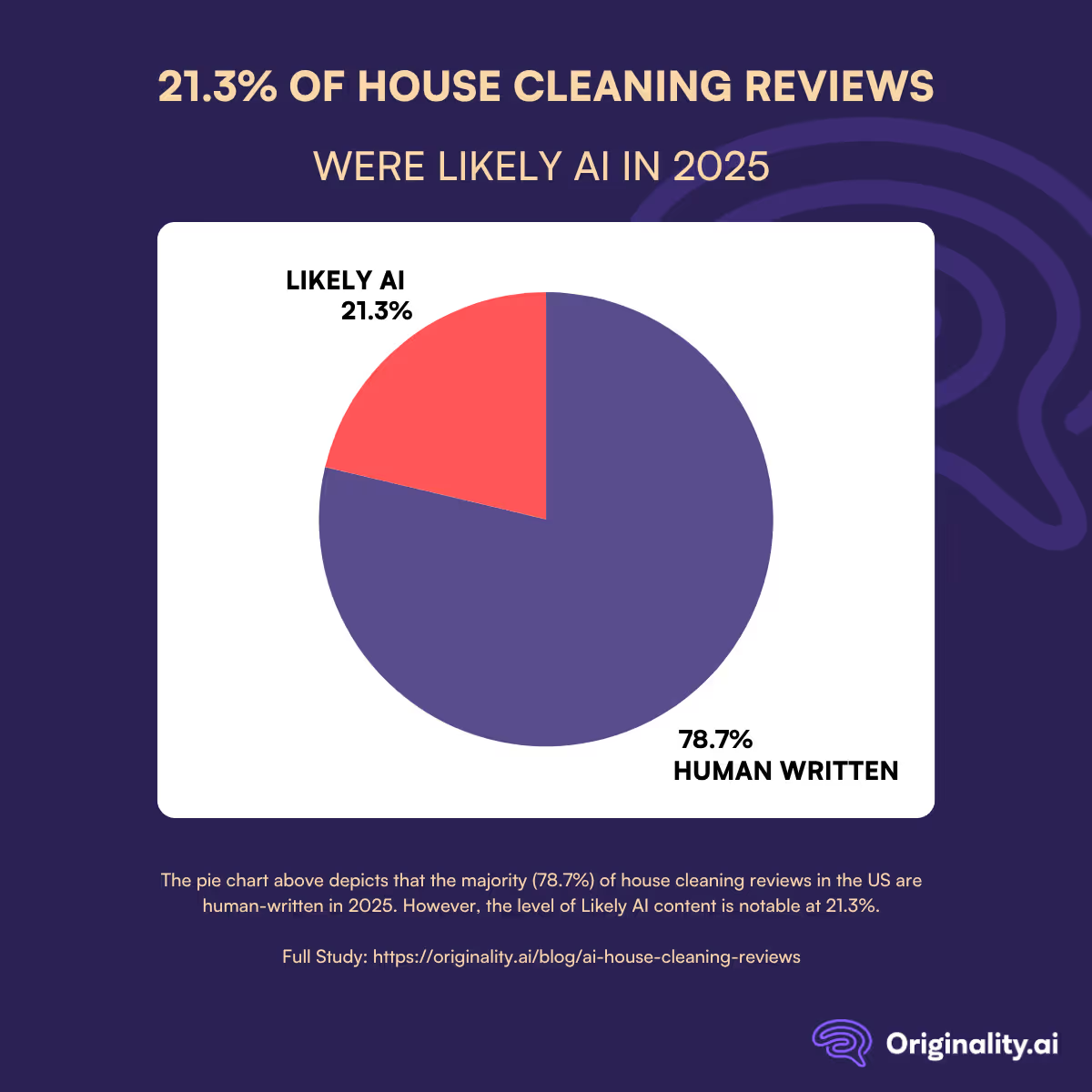
Across the complete dataset, 11.02% of house cleaning reviews are Likely AI. While the majority of reviews at 88.98% are still human-written, the proportion of Likely AI-generated content is rising.
When narrowing down the scope to more recent years, particularly 2022 onward, where the launch of ChatGPT and other generative AI technologies became popular, a very clear upward trajectory is seen.
By 2025, the proportion of reviews classified ask Likely AI-generated rose significantly to 21.3%, nearly double the overall average.
This number shows the accelerating adoption of AI tools in industries today and the growing risk of non-genuine content overflowing the internet and falsely influencing customer decisions.
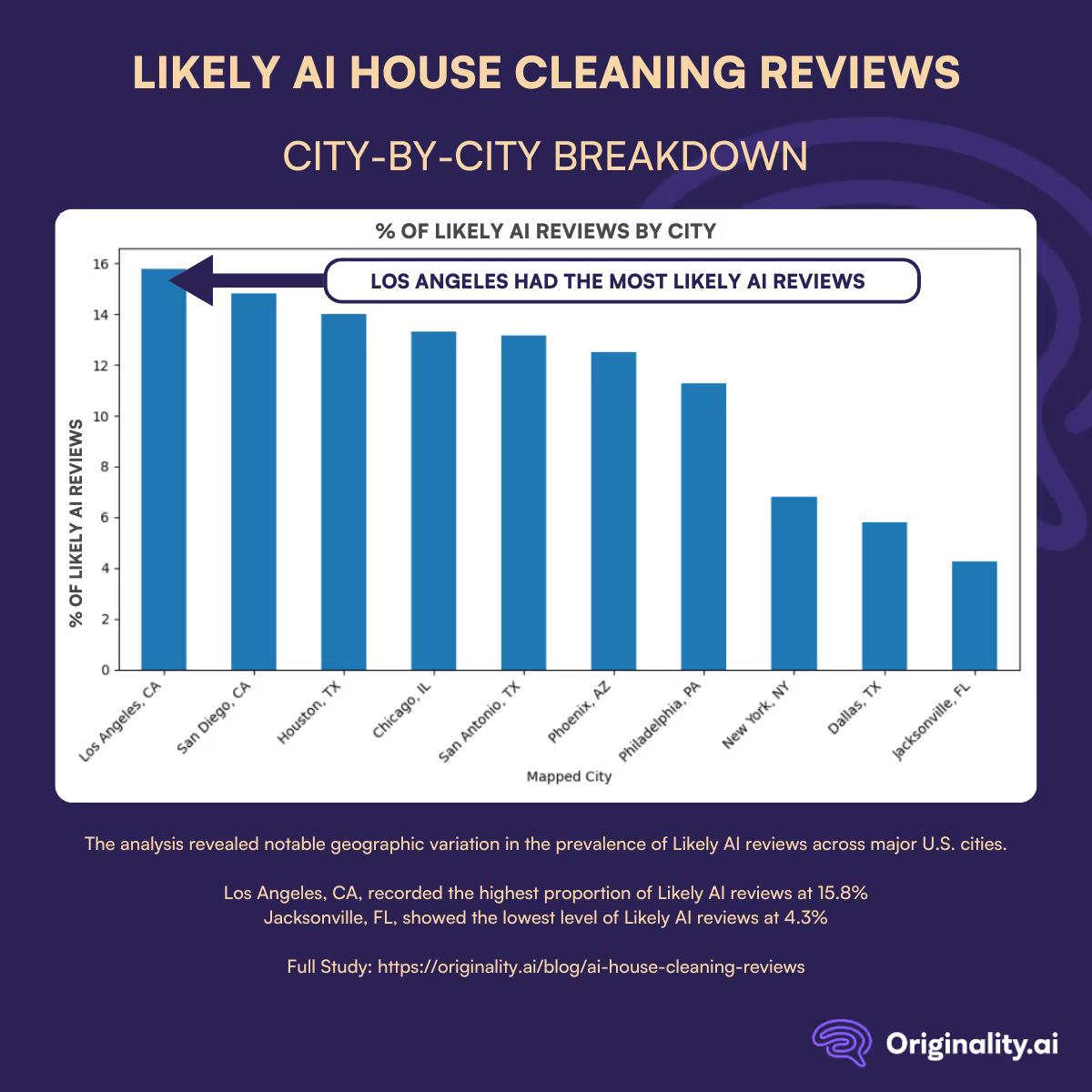
The analysis revealed notable geographic variation in the prevalence of Likely AI-generated reviews across major U.S. cities.
However, not all of the cities studied showed the same high levels of Likely AI reviews. Let’s take a closer look at the cities where AI levels were the lowest:
The disparity across each state suggests that certain metropolitan areas have a noticeably higher proportion of AI adoption.
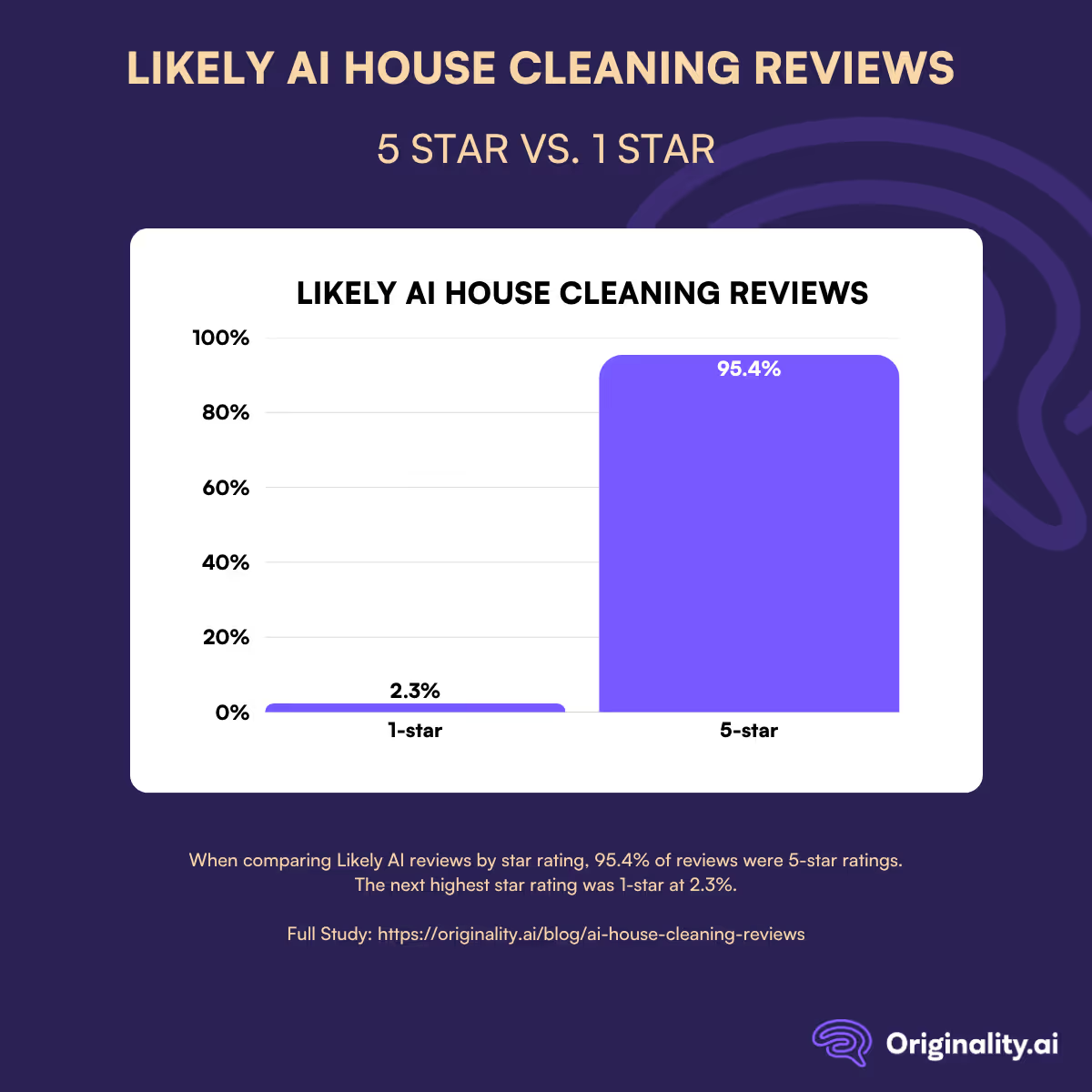
This notable imbalance suggests that Likely AI-generated reviews are predominantly used for either overwhelmingly positive (5-Star) or negative feedback (1-Star).
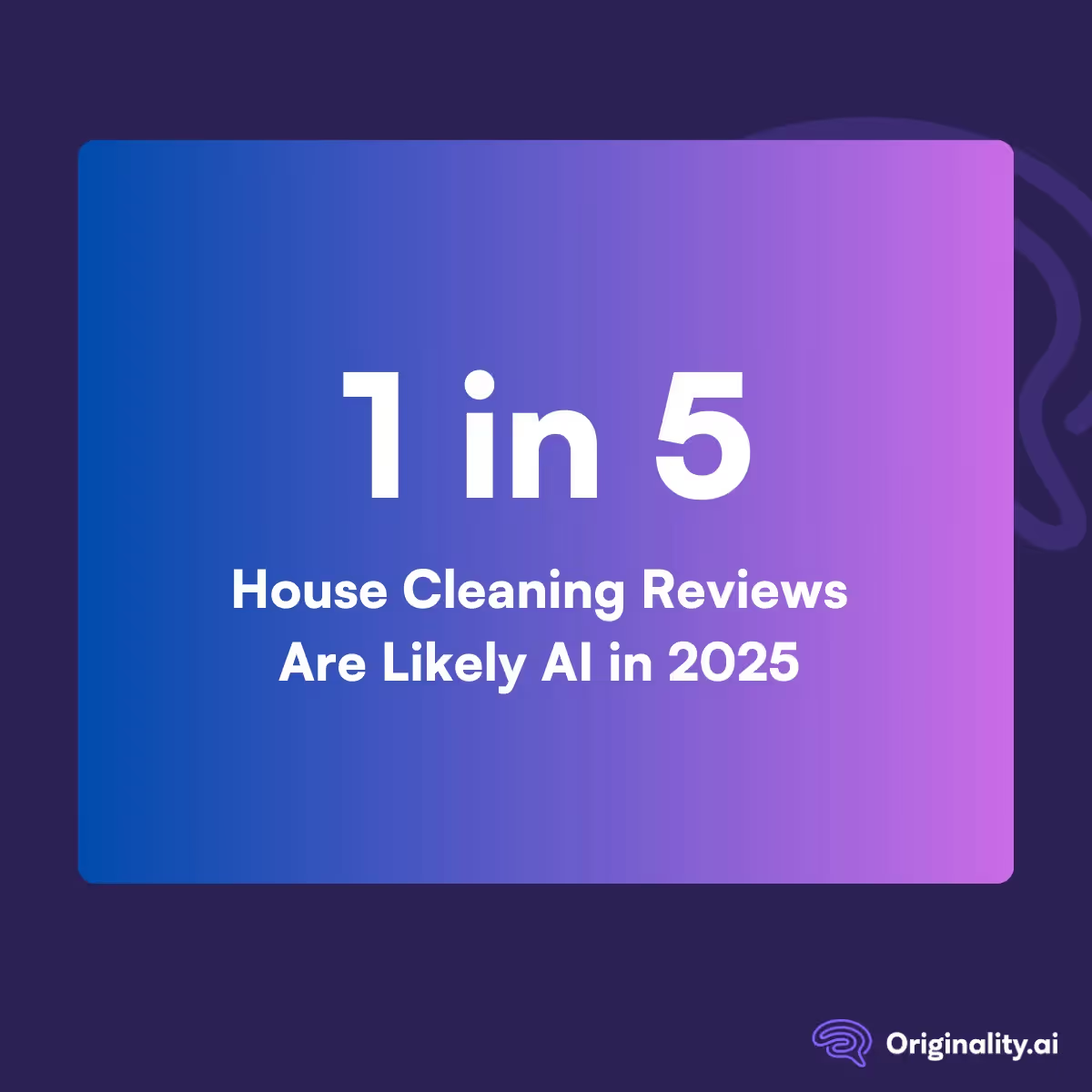
The house cleaning industry represents a unique segment of the service economy, one rooted in local trust, personal referrals, and direct customer experience.
As online reviews increasingly guide consumer decisions, the rise of AI content introduces new challenges.
While AI tools can help businesses quickly generate polished, consistent feedback, their unchecked use undermines authenticity and erodes consumer trust.
This growing trend raises critical concerns about transparency, fairness, and the integrity of reviews.
Without stronger moderation systems and clearer disclosure of AI involvement, the review ecosystem risks becoming more misleading than informative, damaging both consumer confidence and honest competition.
This study highlights the growing presence of Likely AI reviews within the US house cleaning service industry.
Likely AI-classified reviews in 2025 alone account for over 21% of reviews in the house cleaning service sector.
This would mean that at least 1 in 5 reviews now being read is likely AI-generated.
As generative AI tools become increasingly accessible, the integrity of online reviews is at major risk and faces a new challenge.
Platforms and businesses must work to implement detection mechanisms and promote transparency in customer feedback.
Without such safeguards in place, the very tool designed to help consumers make informed decisions could now inadvertently lead to misinformation and eroded trust in consumers.
Wondering whether a post or review you’re reading might be AI-generated? Use the Originality.ai AI detector to find out.
Read more about the impact of AI:
Data Source:
Data was collected via a local business API on RapidAPI, which uses Google Maps and unique business IDs.
The focus was on house cleaning services in 10 major U.S. cities (e.g., New York, Los Angeles, Chicago). A total of 100 businesses were sampled, after cleaning for duplicates, nulls, and irrelevant entries, only reviews with 100+ words were retained, resulting in a dataset of 700+ reviews.
AI Detection & Scoring:
Cleaned reviews were analyzed using the Originality.ai API. Two outputs were recorded:
Each review included metadata such as business name, city, average rating, review text, review rating, AI classification, and confidence score. These data points were used for further analysis and trend identification.

According to the 2024 study, “Students are using large language models and AI detectors can often detect their use,” Originality.ai is highly effective at identifying AI-generated and AI-modified text.